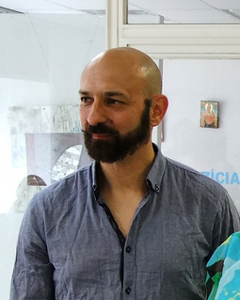There is a special spiritual bridge between Bulgaria and Slovakia related to the mission of the Holy Brothers Cyril and Methodius and their disciples. In the first half of 9 c. the two Byzantine scholars were sent to Great Moravia, part of which is present-day Slovakia, to profess Christianity in the Slavonic language. For the translation of liturgical books Constantine-Cyril the Philosopher invented the Glagolitic alphabet. Later on when Prince Boris I accepted the disciples of the holy brothers in Bulgaria and created conditions for their effective work, the Cyrillic Alphabet emerged in the School of Ohrid, an alphabet easier for writing. As to the Glagolitic one even today the elaborate graphic system of the first Slavonic alphabet has continued to inspire scholars and artists for its exploration and rethinking. It has inspired sculptor Andrey Vrabchev to recreate it into the monumental piece ABV - a  one-ton sphere of black steel with a diameter of 2.4 m. The Bulgarian artist is the only representative of the Balkans at this year's 20th edition of the Sculpture and Object Festival in Bratislava. By the end of August his concept of the Glagolitic Alphabet is to attract the interest of viewers at the park of the Presidency in the Slovak capital.
one-ton sphere of black steel with a diameter of 2.4 m. The Bulgarian artist is the only representative of the Balkans at this year's 20th edition of the Sculpture and Object Festival in Bratislava. By the end of August his concept of the Glagolitic Alphabet is to attract the interest of viewers at the park of the Presidency in the Slovak capital.
For Andrey Vrabchev recreating the graphical and symbolical system of the Glagolitic Alphabet with the language of sculpture is a personal challenge:
“The Glagolitic Script is built on very clear geometrical principles. However the invention of the alphabet proceeded based on Christian symbols and ideas”, Andrey Vrabchev told Radio Bulgaria. “There is a module figure that contains a circle, cross and triangle. Using this module all Glagolitic signs can be effectively written. It is a graphic symbol of the message - I am Jesus Christ from the beginning to end. The passionals read that Constantine-Cyril the Philosopher wrote the alphabet in one night, as the whole alphabet is contained in this single module. This geometrical principle allows a new interpretation of the alphabet in space - its presentation as a spatial issue contained in the sculpture.”
During the festival the Bulgarian Cultural Institute in Bratislava displayed other works by Andrey Vrabchev spanning cultural bridges between Bulgarians and Slovaks.
"This year Bratislava hosted s contest for the 25th anniversary since the collapse of the former regime. On this occasion I cerated a symbolical fence. As the viewer observes the sculpture, it trasforms from a fence depriving man of freedom, into a swing that denotes freedom, flight and breaking away from gravity.”
The Bulgarian sculptor has impressed Slovak audiences with a non-canonic work:
„Sacred Heart of Jesus is one of the symbols of the Catholic denomination. Fire is part of this symbol but I have replaced it with candles from Orthodox Christian churches that some people have seen as Christian unity.”

After the end of the festival in Bratislava the sculpture ABV will continue recounting the story of the Glagolitic Alphabet in Vienna where it will be on display at the Bulgarian Cultural Institute in Wittgenstein Haus.
English Daniela Konstantinova
Photos: Andrey TrebatickyThe European Music Festival invites Sofia residents to a colorful and lively music and dance show, Europe Dances , on 21 May 2025 at 6:30 p.m. under the domes of the Largo. Now in its ninth year, this traditional festival event will once again..
The mobile exhibition "Secrets and Riddles from Heraclea Sintica, Time Travel" will open on May 26 at Slovakia's National Museum. It will remain in Bratislava until the end of July, the director of the museum in the town of Petrich, Katya Stoyanova,..
The Bulgarian Studies program at the University of Illinois – one of the most prestigious in the United States – will include Bulgarian language, Bulgarian history, folklore and traditions as of the next academic year, Bulgaria's Ministry of..
The 'Corner of Kosovo' has been opened at the Sts. Cyril and Methodius National Library . It brings the total number of corners dedicated to different..
On July 1, 1925, at 4:00 pm, the curtain rose at the Old Theatre in Stara Zagora for the first performance of Bulgaria's first opera company outside the..

+359 2 9336 661
